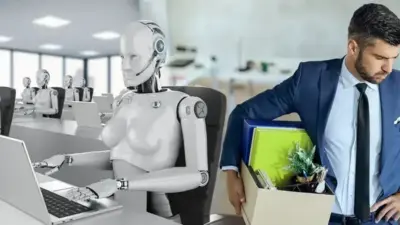You may have already interacted with artificial intelligence without knowing it. If you’ve visited sites like 22casino login or any online service recently, you’ve probably seen it. AI is quietly becoming part of our daily lives. We see it in chat support bots, personalized gaming suggestions, and background fraud detection. In every industry, this rise of AI raises a big question: Is AI truly taking over human jobs, or is it just changing how we work?
The Apprehension of Replacing
The idea that AI will replace your work is one of the most prevalent myths around it. For years, there have been headlines about robots taking over the workforce. Generative AI tools like ChatGPT and DALL·E show incredible skills in tasks once done by humans. This has increased fear about their impact. AI systems help speed up processes, cut labor costs, and reduce errors. They are used in many fields like manufacturing, shipping, customer support, and journalism.
Now, AI-powered chatbots handle consumer inquiries that once needed full-time staff. Sometimes a single chatbot may do the tasks of a support staff of ten people. The need for cashiers and manual labor in retail and fulfillment centers has dropped a lot. This change is mainly because of self-checkout machines and robotic helpers in warehouses.
Unquestionably, these shifts are occurring, and certain roles are indeed being completely replaced. Tasks that are especially at risk include boring, repetitive ones that need little emotional or creative skills.
The Transition into Change
However, that is just one aspect of the situation. While AI might replace certain roles, it’s also creating new ones and transforming old ones. AI is causing job evolution rather than job loss in several areas. Work is changing. People are encouraged to take on more creative, strategic, or social tasks. These are hard for computers to mimic.
Take data analysts as an example. It used to take analysts hours or days to process large datasets, but today AI can do it in seconds. This automation doesn’t eliminate the analyst’s job. Instead, it allows them to focus on decision-making and data analysis. Instead of merely processing data, they are evolving into data strategists.
AI technologies assist doctors by quickly assessing scans and predicting patient risks based on past data. They do not, however, take the place of a doctor’s diagnosis, judgment, or bedside manners. They act as smart helpers. They boost accuracy and speed up decisions, all while keeping human control.
New Skills, New Jobs
The creation of whole new job categories is one of the most underappreciated effects of the AI revolution. Ten years ago, there were hardly any positions such as algorithm auditors, prompt designers, AI ethicists, and machine learning engineers. Businesses need staff to create, manage, and support AI systems as they are used more in daily tasks.
There’s a rising need for experts who can link AI technology to real-world uses. An AI-trained marketing pro or a healthcare worker familiar with clinical AI are examples of hybrid professions. They mix technical skills with industry knowledge.
However, compared to traditional professions, these jobs frequently call for a distinct skill set. Problem-solving skills, computer literacy, and adaptability are rapidly outvaluing regular experience. Employees who retrain or upskill in tech-related fields have a better chance of succeeding in this new setting.
The Human Advantage
Even with its quick development, AI is still not yet able to execute some tasks well and may never be able to. The qualities of creativity, emotional intelligence, empathy, and moral reasoning are still fundamentally human. Education, therapy, administration, design, and many other interpersonal tasks need these qualities.
The human parts of work become more important as AI takes over the mechanical tasks. Soft skills, emotional intelligence, and cultural awareness—aspects of work that are difficult for robots to replicate—are becoming more and more valued by employers.
A Fair Perspective
It would be more accurate to consider AI a job-shaper rather than a job-killer. Similar to the internet, electricity, and cellphones, artificial intelligence (AI) is a general-purpose technology that is altering rather than replacing work.
Indeed, certain roles will be eliminated. However, a lot more will change, and new ones will appear. Making sure employees aren’t left behind in the process is the main obstacle. In order to prepare people for a future in which humans and robots coexist, governments, educational institutions, and businesses must all do their part.
It is essential to invest in training and education. It’s important to develop policies that help employees during transitions. This includes safety nets, reskilling programs, and rewards for sectors that welcome human-AI teamwork.
In summary, AI is redefining employment rather than just replacing them. Automation may eventually eliminate certain jobs, but for those that are flexible, it also creates opportunities for more effective, innovative, and meaningful work. Humans and machines won’t be at odds in the future; rather, it will be about how we can cooperate. We will be better equipped to influence the future of work rather than merely respond to it if we comprehend that transition as soon as possible.



